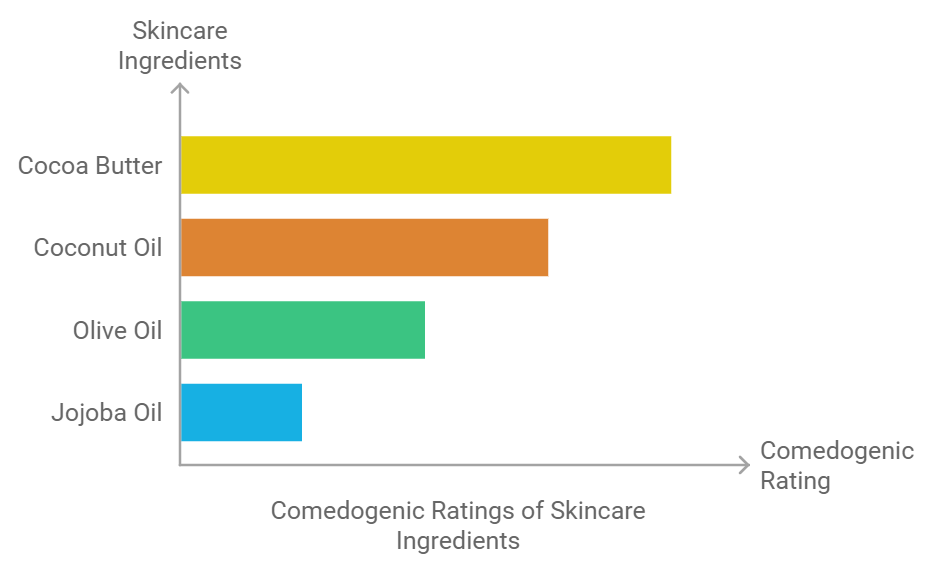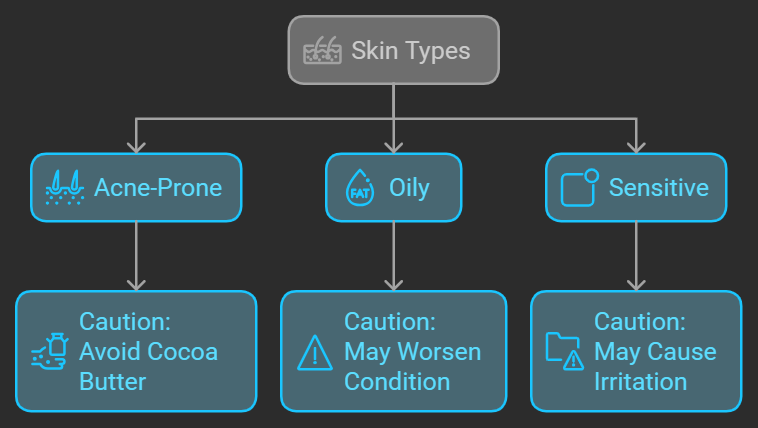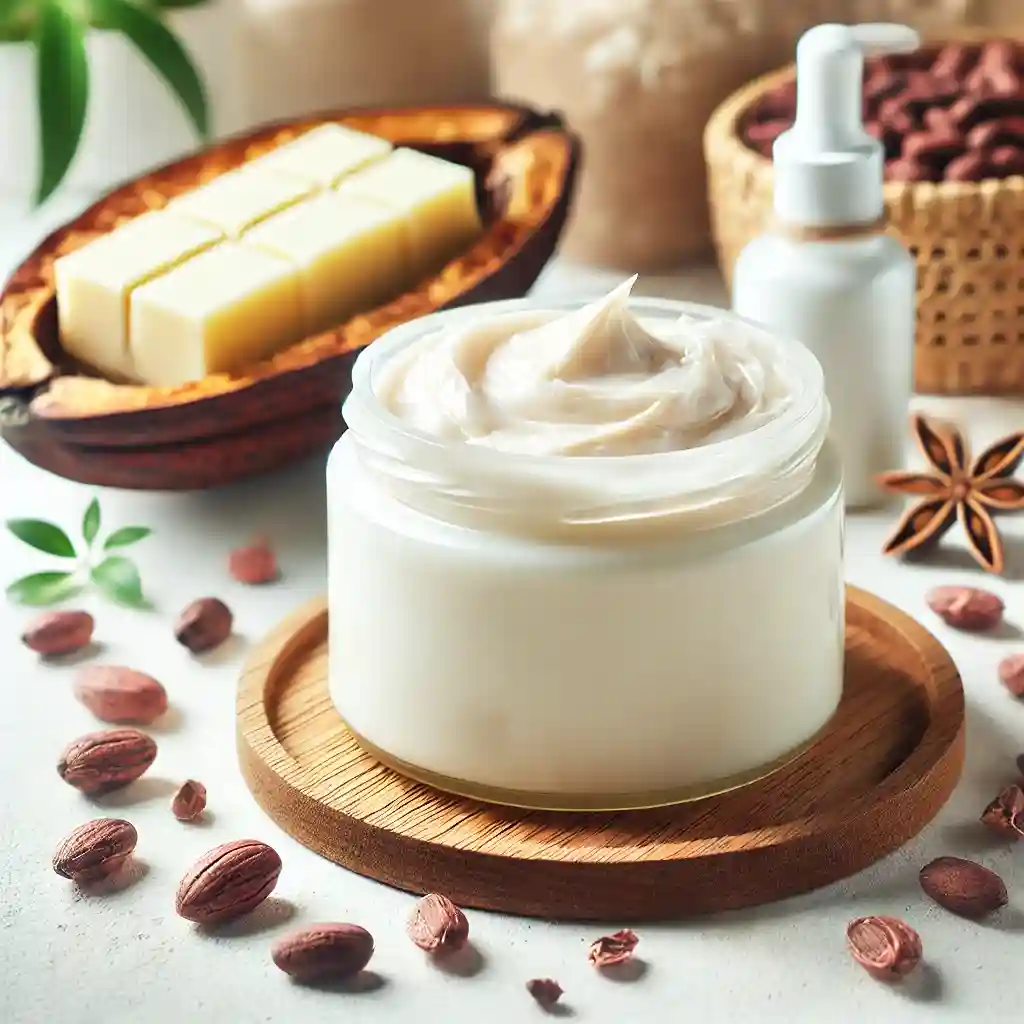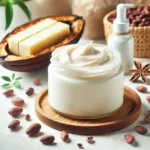- Cocoa butter has a comedogenic rating of 4/5, making it likely to clog pores.
-
Studies confirm that it increases the formation of microcomedones.
-
Dermatologists recommend avoiding it on acne-prone or oily skin.

Skincare routines today are flooded with natural ingredients that promise to nourish and revitalize the skin. Among these, cocoa butter is a long-revered favorite, known for its rich moisturizing properties and luxurious texture. However, alongside its glowing reputation, concerns about its potential to clog pores have been gaining traction, especially for individuals with acne-prone or oily skin. This press release will delve into the science, expert opinions, and real-world experiences surrounding cocoa butter to help users make informed decisions about whether to incorporate it into their skincare routines.
What is Cocoa Butter, and Why the Debate?
Cocoa butter is a natural fat extracted from cocoa beans and is often heralded for its ability to soothe dry, irritated skin and enhance elasticity. This makes it a go-to ingredient in lotions, balms, and body butters. Its creamy consistency and high content of fatty acids such as oleic, palmitic, and stearic acids help to hydrate and nourish the skin’s barrier.
But despite these benefits, there’s growing concern about whether cocoa butter might do more harm than good, particularly for people with acne-prone or oily skin types. The crux of this concern lies in its comedogenic rating, a measure used to evaluate how likely a substance is to clog pores and contribute to acne. Cocoa butter has a comedogenic rating of 4 out of 5, positioning it among the higher-risk ingredients for pore congestion and breakouts.

The Science of Cocoa Butter: Research Insights
Several studies have put cocoa butter under the microscope to assess its impact on the skin, particularly in terms of its comedogenicity. One such study found that cocoa butter was highly comedogenic, with a rating of 4, meaning it has a strong potential to block pores, leading to the formation of blackheads, whiteheads, and acne, especially on the face.
Another research publication from the Journal of Cosmetic Dermatology evaluated several common cosmetic ingredients. Cocoa butter again emerged as a high-risk ingredient, particularly for acne-prone skin. This is attributed to its tightly packed molecular structure, which can make it difficult for the skin to absorb without clogging pores.
Interestingly, a third study from the same journal discovered that regular application of cocoa butter could increase the formation of microcomedones, the earliest form of clogged pores. Within just two weeks of consistent use, participants experienced a notable increase in these comedones compared to untreated skin. This research underscores the importance of cautious use, particularly on facial skin prone to breakouts.
Dermatologists Weigh In: Expert Advice and Warnings
Board-certified dermatologists have expressed caution over the use of cocoa butter on acne-prone or oily skin. Dr. Michele Farber from Schweiger Dermatology comments, “Cocoa butter is known to clog pores. I advise my patients to be cautious before applying it to the face, especially if they are prone to acne or breakouts.” She suggests that individuals who are concerned about acne avoid products that list cocoa butter within the first few ingredients.
Similarly, Dr. Alok Vij from the Cleveland Clinic notes, “Cocoa butter has a higher likelihood of causing comedones, or clogged pores, particularly in acne-prone skin.” He adds that while the ingredient has great moisturizing benefits, its application should be limited for those with sensitive or oily skin types.
Balancing Benefits: Cocoa Butter’s Moisturizing Power
While concerns about cocoa butter’s comedogenicity are well-founded, it is important to recognize that this ingredient still holds significant benefits, particularly for those with dry or normal skin. Cocoa butter is rich in fatty acids that penetrate deep into the skin, providing long-lasting moisture. This makes it particularly useful for individuals who struggle with dry, flaky skin or conditions like eczema. It has also been shown to improve skin elasticity and reduce the appearance of scars and stretch marks.
A recent consumer survey by GlobalData revealed that 43% of skincare users reported using cocoa butter-based products regularly, citing their deep moisturizing properties as the primary benefit. For these users, cocoa butter has been a staple in maintaining smooth, hydrated skin during colder months or in dry climates.
Real User Experiences: A Mixed Bag
User experiences with cocoa butter are as varied as skin types themselves. Many people who swear by cocoa butter for its moisturizing abilities also note its drawbacks, particularly when used on acne-prone areas of the skin.
Cautionary Tales
One user on a popular skincare forum, Reddit, shared their experience: “I have dry, sensitive skin and tried using raw, unrefined cocoa butter on my face. Unfortunately, I quickly realized it’s very comedogenic. My skin broke out after just a few days, so I’d advise others to patch test before applying it to their entire face.”
On the Badger & Blade forum, another user expressed hesitation about using cocoa butter in shaving soaps, stating, “I did more research online, and indeed cocoa butter is listed as pretty comedogenic (pore-clogging). Now I’m hesitant to use it too often, as I’d rather avoid acne breakouts.”
Positive Experiences
However, not all reviews are negative. For individuals with very dry skin, cocoa butter can be a game-changer. Another Reddit user wrote: “My skin loves oils and occlusives, so cocoa butter suited me perfectly. For the first time in a long time, I woke up with my skin feeling hydrated, nourished, and bouncy without any dryness.”
These varied experiences highlight an important takeaway: cocoa butter’s suitability depends largely on the individual’s skin type and how they use the product.
Should You Use Cocoa Butter? A Skin Type Breakdown
Given the mixed research and user experiences, whether or not you should use cocoa butter in your skincare routine depends primarily on your skin type and how your skin reacts to oils and occlusives.
Who Should Avoid Cocoa Butter?
- Acne-prone skin: If you tend to break out easily, it’s best to avoid cocoa butter or use it sparingly. Its high comedogenic rating means it could worsen acne or cause new breakouts.
- Oily skin: Cocoa butter may exacerbate oiliness, leading to clogged pores and increased acne.
- Sensitive skin: While cocoa butter can soothe dry skin, its tendency to clog pores may cause irritation or breakouts in individuals with sensitive skin.
Who Could Benefit from Cocoa Butter?
- Dry skin: If your skin is extremely dry or dehydrated, cocoa butter’s rich fatty acids can provide the moisture and nourishment your skin craves. It’s particularly useful for restoring the skin’s barrier and preventing moisture loss.
- Normal skin: For those with normal skin, cocoa butter can be a great occasional treat for deep moisturization, especially in harsh weather conditions.
- Patch test first: Regardless of skin type, always patch test cocoa butter on a small area of your skin to check for reactions before using it widely on your face or body.
Final Thoughts: The Double-Edged Sword of Cocoa Butter
Cocoa butter offers undeniable benefits for moisturizing and protecting dry skin, but it also carries significant risks for individuals prone to acne or oily skin. The research and dermatologist advice are clear—if you have acne-prone or sensitive skin, it’s wise to approach cocoa butter with caution. If your skin is very dry and can tolerate richer oils, cocoa butter may serve as an excellent addition to your skincare routine, especially when used on the body rather than the face.
As with all skincare, the key is personalization. While cocoa butter is rich in moisturizing benefits, understanding your skin type and how it reacts to certain ingredients is crucial. Always consult with a dermatologist if you are unsure about incorporating a new ingredient into your routine.

I’m a devoted organic skincare enthusiast, passionate about the natural, wholesome goodness that organic products bring to our skin.
Organic skincare isn’t just a hobby for me—it’s a lifestyle. Every product I use, recommend, and write about has been carefully chosen for its purity and effectiveness. Everything I write about is backed by scientific studies, dermatologists’ opinions, and user experiences.
I also excel at tackling skincare challenges with innovative, organic solutions.


